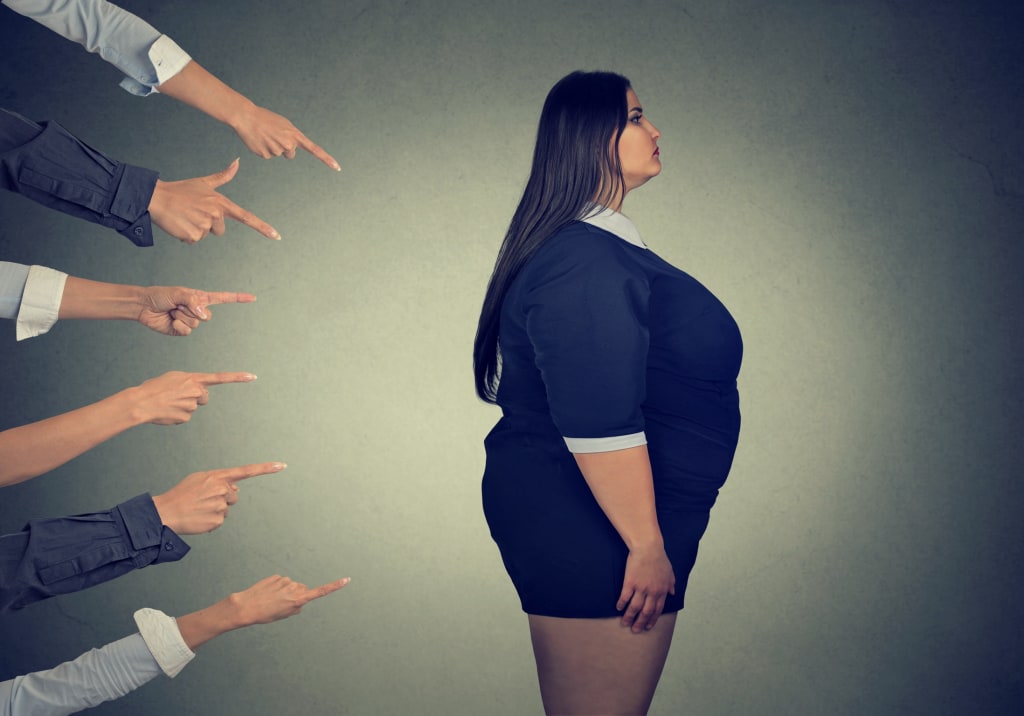Fear of Fat
The Backlash Against Fat Acceptance

Cosmopolitan UK magazine featured Tess Holliday on their October 2018 cover. Tess is a plus-size model and one of the first ever featured in a magazine with the level of notoriety as Cosmo UK. She is a UK size 26/US size 28. To add to the unusual feature, Tess is not wearing a modest dress, but a green bodysuit. Her arms, legs, and the shape of her stomach are exposed for the world to see. She is portrayed as strong and proud of her body. The backlash was quick and intense.
Claims that Cosmo UK and Tess are promoting obesity are coming from average people, celebrities, and various media outlets. Social media comments range from death threats, to accusations of burdening the health care system, to love and support. However, the truth is that the majority of messages and comments are negative.
Although prior to the October 2018 Cosmo cover, I recently read a social media post from a friend of a friend that made blanket, generalizations associating fat acceptance to the Pro-Ana movement. For those unaware, the Pro-Ana movement promotes behavior connected to anorexia nervosa. Anorexia, or Ana, can present itself in many ways; however, it is generally associated with a lack of calorie consumption, the use of medications such as laxatives, and other methods to reduce the absorption of calories. Those suffering from Anorexia may, and often do, have another disorder called Body Dysmorphic Disorder. People with BDD do not see their bodies as other see their bodies. It is most common in those with Anorexia. After the release of the Cosmo UK cover, several posts have made this comparison yet again.
Society harshly judges fat people as unhealthy and unworthy. According to many, fat people should be corrected, criticized, and offered, often unsolicited, advice. An overall assumption exists that fat people are lazy or at least undisciplined. Are there fat people out there who are all of these things? Of course there are; however, there are unhealth, lazy, and undisciplined people who exist in all walks of life and physical appearance.
The experience of fat people being treated differently does not stop on social media. If it did, publications like this and many, many more throughout the internet and hard copy would not exist. My own personal experiences span decades of bullying and unequal treatment. My story of fatphobia started in first grade and continues to this day, over 30 years later. Yet, my desire to not be bullied and be treated with respect is considered the same as promoting an eating disorder or promoting an unhealthy lifestyle.
Let’s be honest here and say that the backlash over Tess Holliday’s Cosmo UK cover photo, the disrespect and poor treatment of fat people, and the assumption that all fat people are unhealth has nothing to do with fat acceptance, eating disorders, or health. The truth is all of this negativity is due to one thing: fear.
Humans are pack animals. Pack animals are notoriously scared of other packs or other animals who look or act differently because these other animals can cause a threat to their own pack either due to illness, predatory behavior, or takeover of territory. This very behavior explains things like racism, homophobia, cliques in schools, and so on. In truth, these separations are rather primal behaviors that remain from early humans. The good news is, is that humans are very intelligent beings and can educate themselves and modify behavior in a manner that supersedes our most basic, primal instincts. At least, we like to think this way. In truth, I’m not so sure that is true. The distrust and dislike of people who look different is only one example of proof that society may not be as evolved as we would like to think.
Are fat people lesser humans because of how they look? Is Tess Holliday a lesser human because of how she looks? Would society not consider her career, the fact that she is a wife and mother, her personality, or education? It appears that many would not. It appears that many people feel that they have the right to be disrespectful to her because she is fat and proud of her body and accomplishments. However, Tess Holliday is a public figure and she puts herself out there knowing that she, like all other public figures, will be disrespected as much or more than she will be praised.
What if it was personal? Your mom, dad, sister, aunt, grandmother, brother, best friend? What if it was me? Am I a lesser human because of how I look? Would you not consider my ten years of education, my 12 years of both volunteer and professional work with victims and the mentally ill, any of the other random accomplishments I have made in my life, or my actual health (as opposed to my assumed health)? Or, would you simply judge me as lazy, unhealthy, and unworthy because I wear the same dress size as Tess Holliday?
There are no easy answers to these questions. There are no easy answers to any of the questions that we have to ask ourselves about acceptance in society, fat or otherwise. We can only do better for ourselves. We all have some reason for society to judge us harshly. Before you judge someone else, before you comment to anyone who stirs a negative emotion in you because of a superficial reason—like their weight—ask yourself why. Maybe you’re just afraid. But, you have nothing to fear from fat people. We just want to live our lives and sometimes wear green body suits on the cover of magazines.






Comments
There are no comments for this story
Be the first to respond and start the conversation.